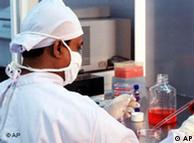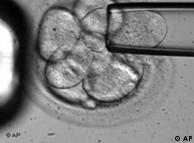DW-World.de
Deutsche Welle
http://www.dw-world.de/dw/article/0,2144,2786897,00.html
Science | 18.09.2007
Doctors: Stem Cell Therapy Breakthrough for Heart Patients
Cardiologists at Düsseldorf University Hospital said they have been the first in the world to use stem cell therapy to save a patient who suffered from a severe heart attack.
Düsseldorf's Rheinische Post newspaper reported the success story of stem cell therapy conducted on a 64-year-old patient.
Bodo-Eckehard Stauer, the director of the cardiology department at Düsseldorf University Hospital, told the Rheinische Post that the patient was "on the verge of dying" after having suffered a severe heart attack. The man spent seven weeks in the intensive care unit with no sign of improvement.
Bildunterschrift: Großansicht des Bildes mit der Bildunterschrift: Germany draws the line at embryonic stem cell research
Stauer decided to apply stem cell therapy on the patient. Following nine days of treatment, the man had improved enough that he could leave intensive care and be moved to a rehabilitation center.
The therapy involved extracting adult stem cells from the patient's bone marrow and then inserting them, with the help of a balloon catheter, into the artery damaged by the infarction.
The procedure took about a half hour.
Stauer called it a "global innovation" in that cardiogenic shock -- inadequate delivery of oxygen to the heart tissues -- could be treated with stem cell therapy for the first time ever.
Embryonic stem cell research banned in Germany
 Bildunterschrift: Großansicht des Bildes mit der Bildunterschrift: Germany draws the line at embryonic stem cell researchSuch stem cell therapy, however, has enlivened the debate on embryonic stem cell research.
Bildunterschrift: Großansicht des Bildes mit der Bildunterschrift: Germany draws the line at embryonic stem cell researchSuch stem cell therapy, however, has enlivened the debate on embryonic stem cell research.
Recently, the German government said it would allocate five million euros ($6.9 million) over the next three years for non-embryonic stem cell research.
Stem cells can develop into different cell types, including those for bones, blood and the brain. Specialists say they can help in treating illnesses such as Parkinson's, and can help to regenerate damaged organs or tissue.
Researchers say embryonic stem cells -- cells taken from days-old human embryos -- are the most promising.
Bildunterschrift: Großansicht des Bildes mit der Bildunterschrift: Minor heart attacks often go unnoticed
However, genetic research is highly contested in Germany due to its Nazi history of experimentation to create a "master race."
Since 2002, the production of embryonic cells from pre-existing stem cell lines is prohibited in Germany. Scientists are also not permitted to research on any lines produced after Jan. 1, 2002 to ensure that foreign laboratories do not create new lines for the German market.
Critics have said that such prohibitions put German scientists at a disadvantage.
Critics of embryonic stem cell research, however, say that progress with adult stem cell treatment, such as with the cardiac patient in Düsseldorf, nullifies the need for cells derived from human embryos.



0 Comments:
Post a Comment
<< Home